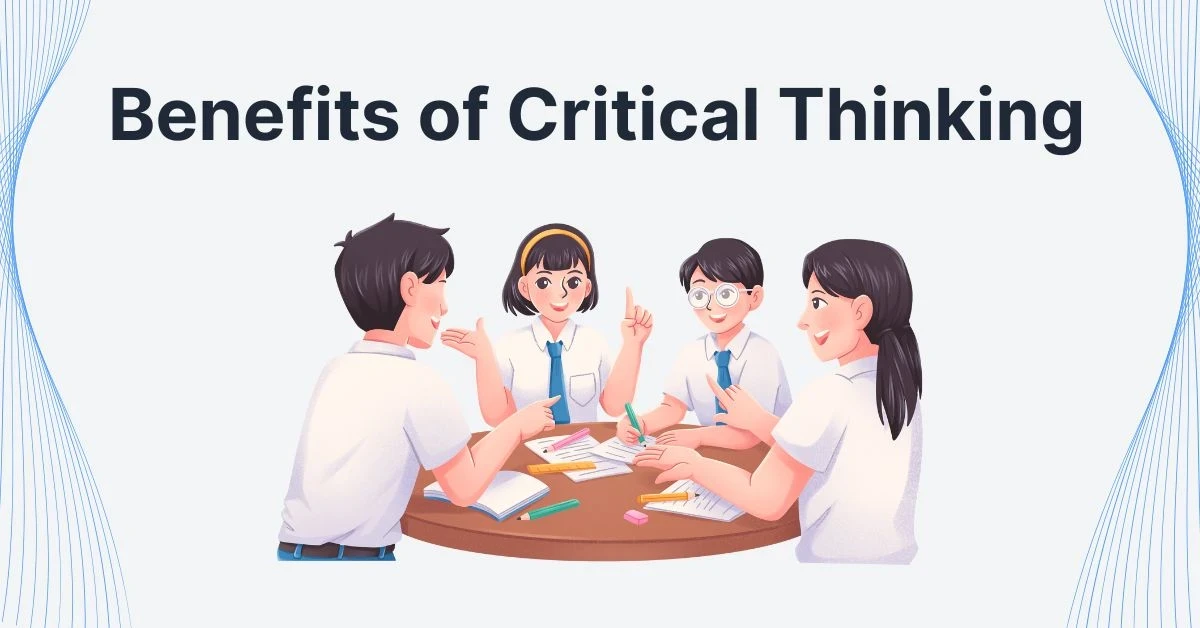What are the benefits of critical thinking skills for students?
Critical thinking plays a vital role in a student’s academic, personal, and professional life. It helps students go beyond memorizing facts—they learn how to ask important questions, evaluate evidence, and make informed decisions. In today’s information-rich world, the ability to think critically is more important than ever.
In this blog post, we’ll explore the top benefits of critical thinking skills for students, provide practical examples, and share tips to develop this valuable skill.
Key benefits of critical thinking skills for students
1. Improves problem solving abilities
Students often face challenges in assignments, group work, or exams. Critical thinking helps them break down complex problems, consider different perspectives, and find logical solutions.
Example: A student working on a science project can use critical thinking to experiment, analyze results, and adjust their method for better outcomes.
2. Boosts academic performance
Critical thinkers understand concepts deeply. This helps them write better essays, participate in discussions, and score higher in tests.
Tip: Reflect on lessons by writing summaries in your own words to improve retention and understanding.
3. Encourages independent thinking
One of the greatest benefits of critical thinking skills for students is independence. They learn to form their own opinions, trust their judgment, and make informed decisions without always relying on others.
Encouragement: Ask “why” and “how” questions to dive deeper into learning.
4. Enhances decision making skills
Whether it’s choosing subjects, managing time, or dealing with peer pressure, students make many daily decisions. Critical thinking helps weigh pros and cons before making a choice.
Real-life use: A student deciding between two courses can evaluate their interests, career goals, and course content using critical thinking.
Beyond school, life is full of uncertainties and challenges. The ability to think critically helps students face real-world problems with confidence.
Example: During a job interview, a critical thinker answers questions thoughtfully, showing reasoning and depth.
6. Promotes creativity and innovation
Thinking critically isn’t just about logic—it also fuels creativity. Students learn to view situations from different angles and develop original ideas.
Activity: Encourage students to brainstorm multiple solutions and evaluate each one logically.
7. Strengthens communication and collaboration
Critical thinkers communicate clearly and respectfully. They back their views with facts and are open to new perspectives, making them great team players.
Tip: Practice group discussions and debates to improve communication and critical thinking together.
In the digital age, students are flooded with information. Critical thinking helps them spot fake news, question biased sources, and make informed choices.
How-to: Teach students to verify facts and check multiple sources before believing or sharing content.
Skills That Critical Thinkers Develop
Curiosity: Asking questions and seeking answers
Research: Gathering and analyzing credible information
Pattern Recognition: Identifying trends and connections
Bias Detection: Recognizing and avoiding biased thinking
These are essential skills not just in school, but in life and the workplace.
How Critical Thinking Helps in the Workplace
Employees with strong critical thinking skills contribute to better decisions, innovative ideas, and efficient teamwork. They:
Solve problems with logic
Question assumptions
Offer well-analyzed solutions
Example: A project manager uses critical thinking to prevent risks and ensure successful delivery.
Frequently Asked Questions (FAQs)
Q1. What are the main benefits of critical thinking for students?
A: It improves problem-solving, decision making, communication, and creativity helping students succeed in school and beyond.
Q2. How can students build critical thinking skills?
A: By asking questions, analyzing content, reflecting on their learning, and practicing logic-based activities.
Q3. Why is critical thinking important in modern education?
A: It prepares students to deal with real-world problems, misinformation, and rapid change.
Q4. Can critical thinking improve exam performance?
A: Yes. Students who think critically understand topics better and write deeper, more logical answers.
Start Developing Critical Thinking Today
The benefits of critical thinking skills for students are endless. These skills not only help students do well in school but also prepare them to succeed in life, make better choices, and think for themselves. By developing critical thinking early, students build a strong foundation for a bright, successful, and thoughtful future.
Encourage yourself or your students to start practicing critical thinking today—it’s one of the most important investments in lifelong learning.





3 thoughts on “Top Benefits of Critical Thinking Skills for Students”
Please drop a comment here
Thanks for sharing with us
I like this post